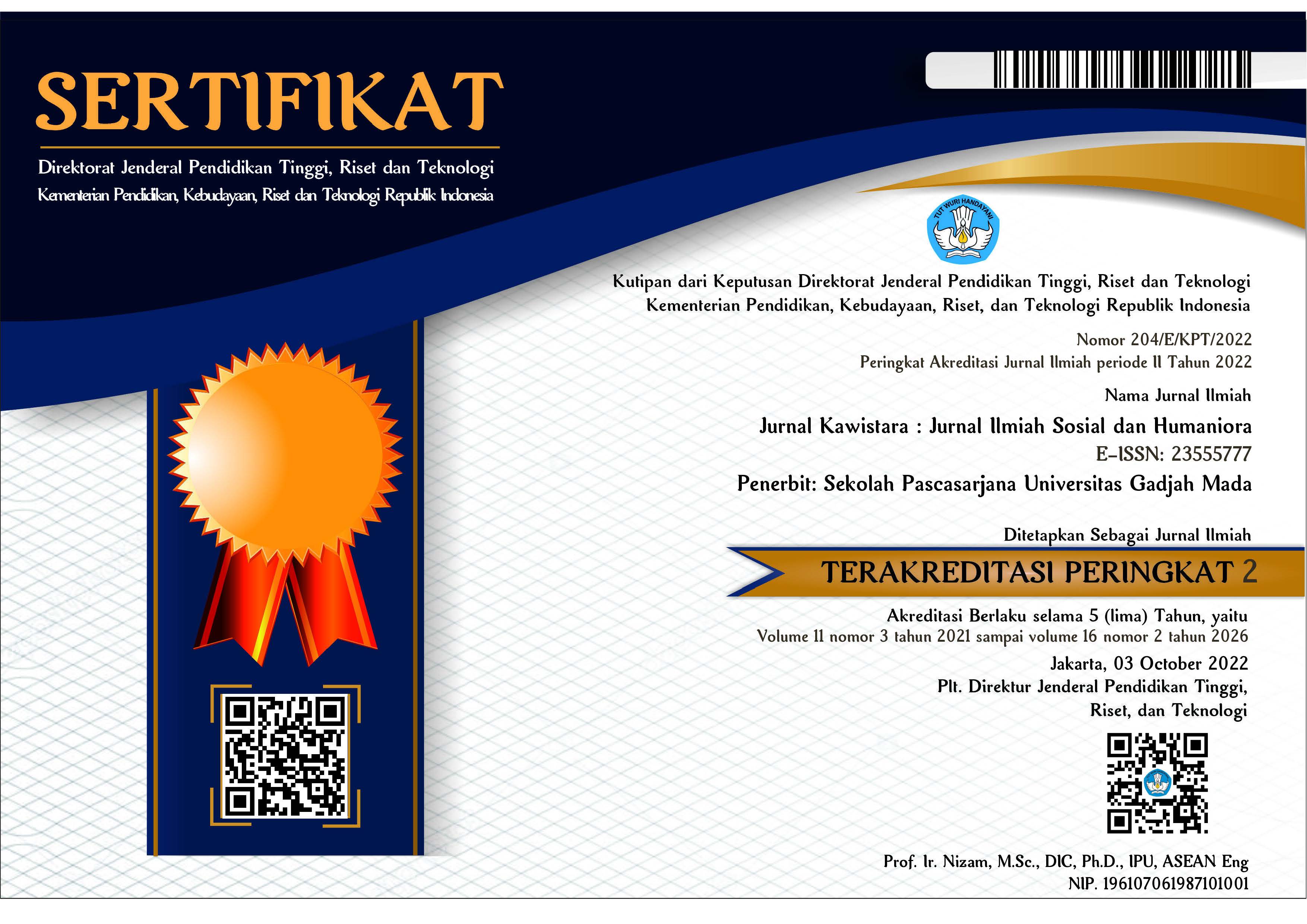NEGOSIASI ATAS ADAT DALAM SISTEM PELAKSANAAN TRADISI NYONGKOLAN SASAK LOMBOK
Abdul Rahim(1*), Wisma Nugraha Christianto(2)
(1) Kajian Budaya dan Media, Sekolah Pascasarjana, Universitas Gadjah Mada
(2) Sastra Jawa, Fakultas Ilmu Budaya Universitas Gadjah Mada
(*) Corresponding Author
Abstract
Nyongkolan is a tradition of parading brides from the groom's home to the bride's home as the ancient Sasak noble habitus that has been crystallized into custom and implemented by all walks of Sasak society today, especially with the contemporary arts of kecimol (Cilokaq Modern Lombok) as a companion. Behind the popularity of the kecimol that is greeted enthusiastically by the community actually raises the potential for conflict. Among the most complained of congestion, eroticism, rah-rah in the streets, to conflicts with road users, residents, or fellow escort. Therefore, the indigenous consisting of Sasak nobility and religious leaders raises the discourse of banning nyongkolan using kecimol with the pretext of not according to custom, deviate from the teachings of Islam, and suggests the use of gendang beleq as a distinctive art area that became hereditary heritage. The problems arising from the ban led to contestation between the Sasak elite and the supporters of the kecimol group. How meeting point of negotiation between the repressing parties and the parties who are in the implementation of the Sasak Lombok nyongkolan tradition is studied with the perspective of Bourdieu’s social practice. The result of the negotiations raises the acceptance agreement of the kecimol as new habitus in implementation of nyongkolan tradition with the need to pay attention to order while escorting, avoiding booze and eroticism, and the use of custom symbols that reflect the Sasak identity.
Keywords
Full Text:
PDFReferences
Arnold, Matthew. 2006. Culture and Anarchy. New York : Oxford University Press.
Aulia, Nisaul. 2012. “ Orgen Tunggal Sebagai Arena Kontestasi Sosial Di Minangkabau”. Tesis Program Magister Kajian Budaya dan Media, Pascasarjana Universitas Gadjah Mada, Arsip Perpustakaan Sekolah Pascasarjana UGM Yogyakarta.
Baudrillard, Jean P. 2009. Masyarakat Konsumsi. Yogyakarta : Kreasi Wacana.
Bourdieu, Pierre. 1987. Choses Dites (Ninik Rochani Sjams, Pentj). Choses Dites : Uraian dan Pemikiran. 2011. Yogyakarta : Kreasi Wacana.
_______. 1990. The Logic of Practice. Cambridge : Polity Press.
Fadjri, M. 2015. “Mentalitas dan Ideologi dalam Tradisi Historiografi Sasak-Lombok Pada Abad XIX- XX. Disertasi Program Studi Ilmu Sejarah FIB UGM Yogyakarta.
Fashri, Fauzi. 2014. Pierre Bourdieu: Menyingkap Kuasa Simbol. Yogyakarta : Jalasutra.
Harker, Richard et. Al. 2009. (Habitus X Modal) + Ranah = Praktik. Pengantar Paling Komprehensif Kepada Pemikira Pierre Bourdieu. Alih Bahasa Pipiet Maizier. Yogyakarta: Jalasutra.
Kali, Ampy. 2013. Diskursus Seksualitas Michel Foucault. Maumere: Penerbit Ledalero.
Kumbara, A.A Ngurah Anom. 2008. Kostruksi Identitas Orang Sasak di Lombok Timur, Nusa Tenggara Barat. dalam Jurnal Humaniora Volume 20 No. 3 Oktober 2008 hlm. 315-326. Yogyakarta: FIB UGM.
Mugni. 2015. Dimensi-Dimensi Praktik Pendidikan & Politik. Serang Banten : CV. Dunia Kata.
Mutahir, Arizal. 2011. Intelektual Kolektif Pierre Bourdieu : Sebuah Gerakan Untuk Melawan Dominasi. Yogyakarta : Kreasi Wacana.
Sarup, Madan. 2011. Post-Structuralism and Postmodernism : Sebuah Pengantar Kritis. Alih Bahasa : Medhy Aginta Hidayat. Yogyakarta : Jendela
Saukko, Paula. 2003. Doing Research in Cultural Studies, An Introduction to Classical and New Methodological Approaches. London : Sage Publications
Storey, John. 2010. Cultural Studies dan Kajian Budaya: Pengantar Komprehensif Teori dan Metode. Yogyakarta : Jalasutra.
Strinarti, Dominic. 2009. Popular Culture: Pengantar Menuju Teori Budaya Populer. Alih bahasa Abdul Muchid. Yogyakarta : Ar-Ruzz Media.
Sudipa, I Nengah, Wayan Redig, Ni Luh Ariani dkk. 2012. Gendang Beleq Lombok Nusa Tenggara Barat. Denpasar : Balai Pelestarian Nilai Budaya Badung (Bali, NTB, NTT) bekerja sama dengan Pusat Kajian Bali Universitas Udayana Bali.
Tuarita, Annisa Nurjanah. 2014. "Perlindungan Hak Kekayaan Intelektual Terhadap Kesenian Gendang Beleq Masyarakat Suku Sasak sebagai Pengetahuan Tradisional dan Ekspresi Budaya Tradisional". Skripsi Program Sarjana Fakultas Hukum Universitas Brawijaya Malang. Arsip Perpustakaan Universitas Muhammadiyah Mataram
Yaningsih, Sri. 1991. Ensiklopedi Musik dan Tari Daerah Nusa Tenggara Barat. Departemen Pendidikan dan Kebudayaan, Kanwil Propinsi NTB. Proyek Pembinaan Kesenian NTB.
Yudarta, I Gede, I Nyoman Pasek. 2017. Kecimol Music as Cultural Identification of Sasak Ethnic. dalam MUDRA Journal of Art and Culture, Volume 32 No. 3 September 2017 hlm. 314-318. ISI Denpasar.
Yudiaryani. 1997. " Metode Transformasi, Sistem via Negativa, dan Teknik Trance dalam Proses Kreatif Jerzy Grotowski" dalam SENI : Jurnal Pengetahuan dan Penciptaan Seni, V/03-04. Yogyakarta: BP ISI Yogyakarta.
Article Metrics
Refbacks
- There are currently no refbacks.
Copyright (c) 2019 Abdul Rahim and Wisma Nugraha Christianto

This work is licensed under a Creative Commons Attribution-ShareAlike 4.0 International License.
Jurnal Kawistara is published by the Graduate School, Universitas Gadjah Mada.











